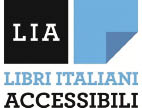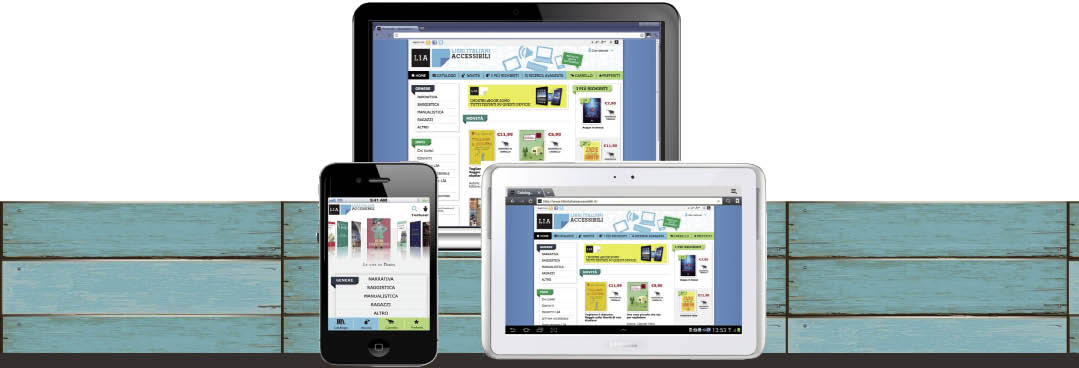|
On June 18th, 2013, as part of the official presentation of LIA-Accessible Italian Books held at the Hall of Columns of the Chamber of Deputies in Palazzo Marini in Rome, the LIA showcase was put online at www.libriitalianiaccessibili.it where a large continuously updated catalog is available and composed of over 3,600 ebooks of fiction and non-fiction works which can be purchased online through major bookstores and accessible to readers who are blind and visually impaired. The catalog, divided by genres, is quite varied: from the new publishing initiatives to the latest bestsellers, from essays of fiction and non-fiction to books for children (categorized according to the different age groups) to manuals. The LIA showcase is the result of a project carried out by the Italian Publishers Association in collaboration with the Italian Union of the Blind and Visually Impaired and the Institute for the Blind F. Cavazza, thanks to a grant from the Ministry of Cultural Heritage and Activities, which had the objective of increasing the availability of accessible editorial content and offering people who are blind and visually impaired the same equal chance of reading as that of other readers. Promoting a cultural change in the way actors in the publishing industry have always dealt with the issue of accessibility and making use of the potential offered by new technologies and ebooks, project LIA has designed and progressively developed an innovative model of production, inventory and distribution of books integrated as fully as possible within the existing processes of the traditional publishing industry, making accessible versions available to blind and visually impaired readers when and how they please. The LIA model, based on the use of the most popular publishing standards such as ONIX and EPUB, makes it possible to move upstream the production of affordable ebooks and to distribute them through retail and conventional digital loan channels. Choosing not to create parallel paths and separate digital books in accessible formats, but, on the contrary, to integrate as much as possible the existing channels, is one of the distinctive features of the LIA project, which has won awards and mentions at the international level. Among others, the UN has stated that this project is among the most interesting case studies in the context of international accessibility G3ict - Global Initiative for Inclusive ICTs. In order to launch its new model of production and distribution and achieve its goal, project LIA was first committed in actively involving all stakeholders of the digital publishing industry: publishers, online libraries and distribution platforms for digital loan. To each of the fifty publishers that have joined the LIA project were provided both general guidelines for the production of ebooks that integrate right from the first edition the technical characteristics necessary to be properly enjoyed by readers who are blind and visually impaired using the most common assistive technologies and, when necessary, targeted advice and on the job support aimed at achieving autonomy for the production of accessible ebooks already in their production phase. |
|
||
|
In parallel with these awareness raising and support activities, LIA has developed the technological infrastructure that allows one to manage the process of production and distribution of accessible formats. In particular, through a technological infrastructure are coordinated and monitored the flow verification, conversion, certification and metadata of ebooks provided by publishers. It allows publishers to have the LIA stamp which certifies the accessibility of ebooks, to capture in the catalog the information about the accessibility of the ebooks on the market operated by IE-Information Editorials and, finally, to display the LIA stamp, allowing people to recognize which ebooks are accessible on the websites of the online bookstores BookRepublic, Deastore, net-ebooks by Mediaworld, UltimaBooks and on the distribution platforms for digital loan that have joined the project, MediaLibraryOnline, Sebina Store and Rete Indaco. However, to ensure access to the entire digital reading experience, it is not enough to produce accessible ebooks and distribute them through traditional channels. It is equally necessary that the platforms selling ebooks be accessible, as well as the electronic payment processes, devices, software and reading applications. To achieve its objectives, LIA has organized a series of interviews with actors external to the publishing industry itself to raise awareness on accessibility. After making a series of tests, in collaboration with the Institute for the Blind F. Cavazza, to assess the level of accessibility of the online books buying process and having identified on one part the critical elements and the other the possibilities for improvement with a constant awareness of those involved, LIA, in agreement with the Union of the Blind and Visually Impaired, contacted the Italian Banking Association for a joint intervention on the accessibility issue of payment procedures.
Thanks to this collaboration, the Web pages for electronic payment of Banca Sella and Gruppo Intesa San Paolo have been made accessible to people with visual disabilities. Also in collaboration with the Institute for the Blind F. Cavazza, LIA has conducted a series of tests relating to the accessibility of the most popular reading devices, software and apps, in order to identify for blind and visually impaired readers the most accessible reading solutions that are currently available on the market. And, on the basis of the findings of these tests, LIA brought attention to the issue of accessibility, pointing out to the developers of the scanning solutions that had been tested, the changes and improvements that should be made and, simultaneously, providing them with possible action measures for the development of accessible solutions for visually impaired. However, from the talks that took place, it has not been possible to obtain information nor a firm commitment about the possibility of releasing an accessible version of these digital reading tools. Consequently, the operational structure of LIA decided to initiate a plan that involved the design and development of some applications for accessible and interoperable reading with the leading assistive software able to handle both the ebooks with social DRM, and those with Adobe DRM. |
In this context, LIA, in collaboration with the Istituto Cavazza, has requested the development by Bologna's software house MDV the reading application SoloEPUB for the iPhone and iPad, accessible and interoperable with the leading assistive software used by blind and visually impaired readers available for free on the App Store. Currently, the software house MDV is also developing the application SoloEPUB for Windows to read ebooks with social DRM even on the desktop. At the same time, LIA has entrusted the 3WLab software house, specializing in the publishing industry, the development of an accessible application to read Adobe DRM protected ebooks on iOS mobile devices. Given the innovative nature of the project and at the same time the continuing evolution of reading systems and, more generally, of the digital world, LIA has launched, in collaboration with the Istituto Cavazza a service help desk for users in order to provide information and support on the one hand relating to the means of access, use and enjoyment of the service developed by LIA and on the other hand to collect requests, comments and suggestions interactively and assess the consistency of the service offered with the needs and expectations of users. This dynamic approach is almost indispensable in view of the rapidity with which the frame of reference of the digital world changes. |
||
|
Publishers and Brands Adelphi, Armando Editore, |
|||


